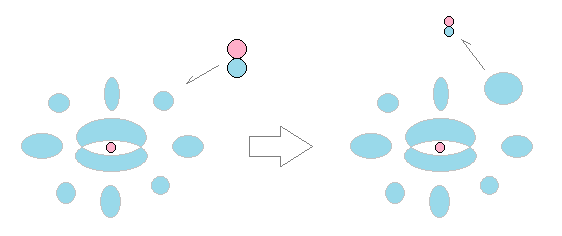It's well know that physical processes slow down at high speeds, and I propose an explanation for this in my chapter on kinetics. The faster something moves, the harder it is to transfer energy to it. When we approach the speed of light, it's virtually impossible to transfer energy onto the speeding object, and the consequence of this is that all physical processes slow down. Time grinds to a halt.
The reason for this is that the transfer of energy onto objects of inertial matter involves the aether. Particles in the aether communicate energy from one object to another. However, this can only happen when objects travel slower than the particles in the aether.
These particles are photons and neutrinos that move at the speed of light. Hence, no energy can be passed onto objects that reach this speed.
 |
| Energy transfers slow down for speeding objects |
This is analogous to us trying to push energy onto a moving cart. We can only do this as long as the cart moves slower than us. Once the cart reaches a speed close to our own speed, it becomes time consuming and difficult to transfer more energy onto it. Should the cart reach our own speed, energy transfers become impossible.
However, it's incorrect to say that time stops at the speed of light, because no time implies no change. If time stopped at the speed of light, photons would be incapable of change. However, photons are characterized by their ability to change. They carry energy from one place to another. They can also change their polarity and direction.
 |
| Photon transferring energy onto a Neon atom |
This poses a paradox. Time grinds to a halt for objects that approach the speed of light, yet this does not stop photons from changing in all sorts of ways even though they travel at the speed of light.
The key to unraveling this paradox is to keep in mind that time is an abstraction. Time is relative motion, and it can only be measured relative to inertial matter. When we say that time grinds to a halt when an object approaches the speed of light, we're referring to energy transfers onto inertial matter. We're talking about inertia.
But photons are not inertial. In contrast to inertial matter which require the help of the aether to change energy, photons require no help. Each photon is a self contained package of particle and pilot wave. Photons carry their own energy transferring mechanism with them.
 |
| Photon traversing a transparent medium |
Photons, wrapped in their pilot waves, change through direct contact. This is unaffected by the fact that they move at the speed of light.
Without inertia, all changes are merely a matter of speed. Hence, photons change at the speed of light. However, with inertia, all changes are relative to the speed of particles in the aether. The closer we get to the speed of light, the slower things change, and this explains why time grinds to a halt for inertial matter at high speeds, but not for photons even thought they travel at the speed of light.
This demonstrates once again that time is a concept tied to inertia, and that time becomes a meaningless concept when applied directly to photons without any reference to something inertial like a clock or a ruler.
No comments:
Post a Comment